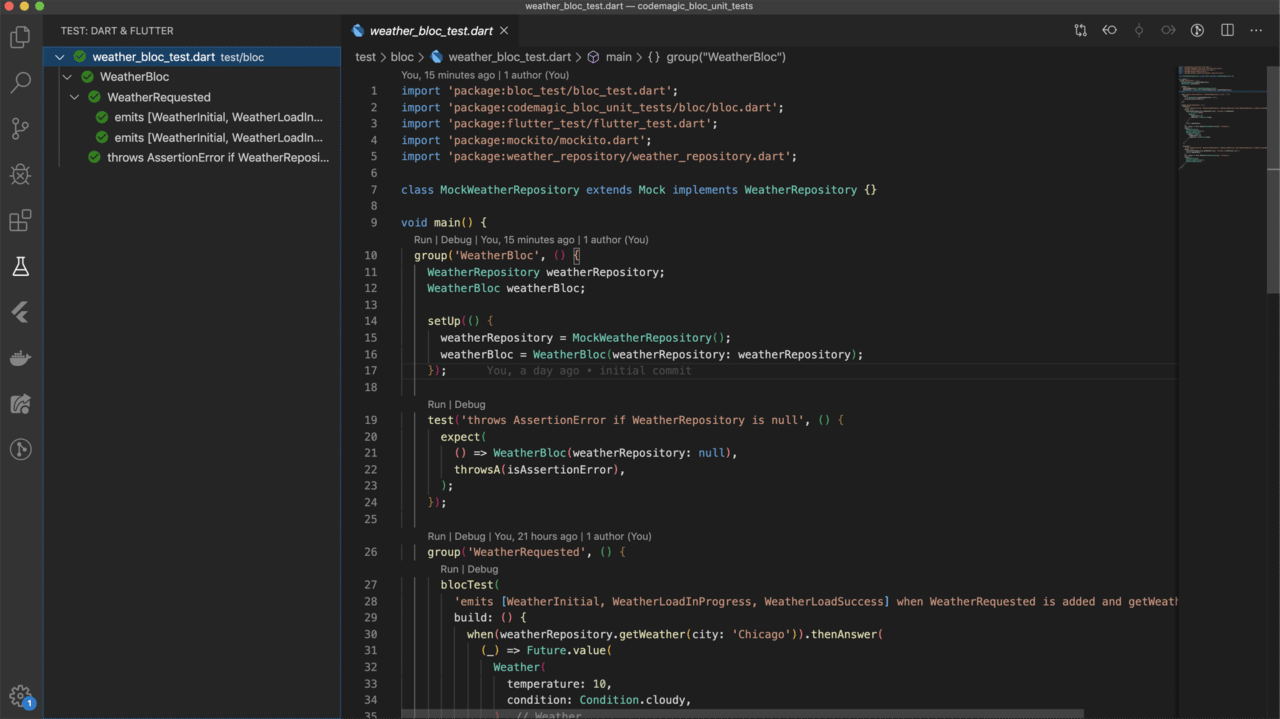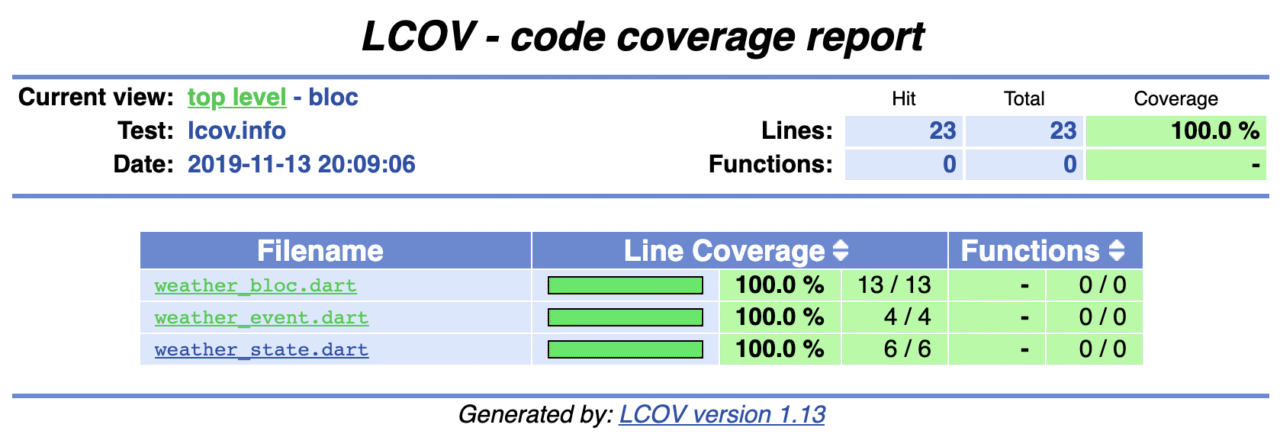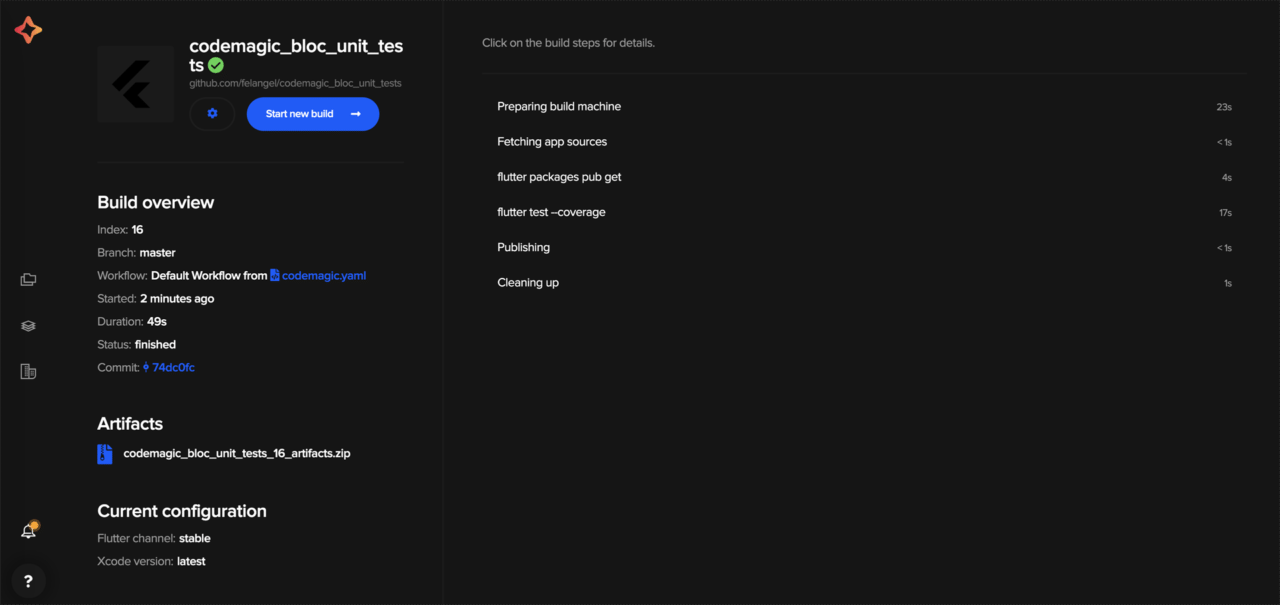Written by Felix Angelov
v2.0.0 of the bloc library introduced some major testing improvements, making it easier than ever to unit test blocs. Today, we’ll learn to fully test blocs as well as how to run the tests as part of the Codemagic pipeline using the new codemagic.yaml. Let’s get started! 🎉
For this tutorial, we’re going to be building a WeatherBloc which will be interacting with a WeatherRepository to retrieve weather information for a given city.
Weather Repository
For simplicity, the WeatherRepository will just return mock weather data but you can refer to the bloc library weather tutorial for a complete example of how to hook it up to a real API and fetch real weather data.
// weather_repository.dart
import 'dart:async';
import 'package:meta/meta.dart';
import 'models/models.dart';
class WeatherRepository {
Future<Weather> getWeather({@required String city}) async {
await Future.delayed(Duration(seconds: 1));
return Weather(
temperature: 30,
condition: Condition.sunny,
);
}
}
The Weather model implementation is also simplified in order to focus on unit testing and simply contains a temperature (in celsius) and a condition.
// weather.dart
import 'package:equatable/equatable.dart';
import 'package:meta/meta.dart';
enum Condition { sunny, rainy, cloudy }
class Weather extends Equatable {
final double temperature;
final Condition condition;
const Weather({
@required this.temperature,
@required this.condition,
});
@override
List<Object> get props => [temperature, condition];
}
Now that we’ve defined the WeatherRepository, we can move on to the WeatherBloc implementation.
Weather Bloc
The WeatherBloc will be responsible for taking WeatherEvents as input and emitting WeatherStates as output. Be sure to refer to the bloc library core concepts if you haven’t already.
Let’s start by defining the WeatherEvents!
Events
In this example, the WeatherBloc will only need to react to a single event: WeatherRequested. The WeatherRequested event will contain the city for which the weather was requested.
// weather_event.dart
import 'package:equatable/equatable.dart';
import 'package:meta/meta.dart';
abstract class WeatherEvent extends Equatable {
const WeatherEvent();
}
class WeatherRequested extends WeatherEvent {
final String city;
const WeatherRequested({@required this.city});
@override
List<Object> get props => [city];
}
States
The WeatherBloc will have four different states that it can emit:
WeatherInitial- the initial state of the bloc before any events are added.WeatherLoadInProgress- the state of the bloc immediately after aWeatherRequestedevent is added while the weather is being retrieved asynchronously.WeatherLoadSuccess- the state of the bloc after weather has been successfully retrieved.WeatherLoadFailure- the state of the bloc after weather has been unsuccessfully retrieved.
import 'package:equatable/equatable.dart';
import 'package:meta/meta.dart';
import 'package:weather_repository/weather_repository.dart';
abstract class WeatherState extends Equatable {
const WeatherState();
@override
List<Object> get props => [];
}
class WeatherInitial extends WeatherState {}
class WeatherLoadInProgress extends WeatherState {}
class WeatherLoadSuccess extends WeatherState {
final Weather weather;
const WeatherLoadSuccess({@required this.weather});
@override
List<Object> get props => [weather];
}
class WeatherLoadFailure extends WeatherState {}
Bloc
Now that the WeatherEvents and WeatherStates have been defined, we can implement the WeatherBloc.
import 'dart:async';
import 'package:bloc/bloc.dart';
import 'package:meta/meta.dart';
import 'package:weather_repository/weather_repository.dart';
import './bloc.dart';
class WeatherBloc extends Bloc<WeatherEvent, WeatherState> {
final WeatherRepository _weatherRepository;
WeatherBloc({@required WeatherRepository weatherRepository})
: assert(weatherRepository != null),
_weatherRepository = weatherRepository;
@override
WeatherState get initialState => WeatherInitial();
@override
Stream<WeatherState> mapEventToState(
WeatherEvent event,
) async* {
// TODO: Add Logic
}
}
We start by defining the WeatherRepository as a dependency of the WeatherBloc. We also set the initialState of the bloc to be WeatherInitial and now all that’s left is to implement mapEventToState.
@override
Stream<WeatherState> mapEventToState(
WeatherEvent event,
) async* {
if (event is WeatherRequested) {
yield* _mapWeatherRequestedToState(event);
}
}
Stream<WeatherState> _mapWeatherRequestedToState(
WeatherRequested event,
) async* {
yield WeatherLoadInProgress();
try {
final weather = await _weatherRepository.getWeather(
city: event.city,
);
yield WeatherLoadSuccess(weather: weather);
} catch (_) {
yield WeatherLoadFailure();
}
}
Awesome! At this point we have a fully functional weather bloc which we can hook up to our UI using the flutter_bloc package. For this article we’re just going to focus on unit testing the newly created WeatherBloc.
Unit Testing with “bloc_test”
Finally, we’re going to learn how to unit test the WeatherBloc in order to ensure that it functions as we expect and to give us confidence that over time, changes to the code don’t break the WeatherBloc functionality.
We’ll start by setting up the test file to have an over-arching group for all WeatherBloc tests.
// weather_bloc_test.dart
import 'package:flutter_test/flutter_test.dart';
void main() {
group('WeatherBloc', () {
// TODO: Write Tests
});
}
The very first test we’ll write is just to ensure that the bloc will throw an AssertionError if a WeatherRepository is not provided.
// weather_bloc_test.dart
import 'package:codemagic_bloc_unit_tests/bloc/bloc.dart';
import 'package:flutter_test/flutter_test.dart';
void main() {
group('WeatherBloc', () {
test('throws AssertionError if WeatherRepository is null', () {
expect(
() => WeatherBloc(weatherRepository: null),
throwsA(isAssertionError),
);
});
});
}
We can run the test via flutter test or directly in VSCode or Android Studio and ensure that it passes.
Next, we’ll move on to the fun part: bloc functionality tests.
Generally, it’s good to create a group per event with tests to ensure that the bloc reacts to the event in every scenario. In this case, there is only a single event so we’ll just create one group within the WeatherBloc group called WeatherRequested.
// weather_bloc_test.dart
import 'package:codemagic_bloc_unit_tests/bloc/bloc.dart';
import 'package:flutter_test/flutter_test.dart';
void main() {
group('WeatherBloc', () {
test('throws AssertionError if WeatherRepository is null', () {
expect(
() => WeatherBloc(weatherRepository: null),
throwsA(isAssertionError),
);
});
group('WeatherRequested', () {
// TODO: Add Tests
});
});
}
Next, we’ll import mockito and define a MockWeatherBloc which will allow us simulate every possible outcome.
// weather_bloc_test.dart
import 'package:codemagic_bloc_unit_tests/bloc/bloc.dart';
import 'package:flutter_test/flutter_test.dart';
import 'package:mockito/mockito.dart';
import 'package:weather_repository/weather_repository.dart';
class MockWeatherRepository extends Mock implements WeatherRepository {}
void main() {
group('WeatherBloc', () {
test('throws AssertionError if WeatherRepository is null', () {
expect(
() => WeatherBloc(weatherRepository: null),
throwsA(isAssertionError),
);
});
group('WeatherRequested', () {
// TODO: Add Tests
});
});
}
We can now define and initialize a WeatherBloc with a MockWeatherRepository in the WeatherBloc group’s setUp. setUp will get run before each test in the group to ensure that every test starts off in the exact same state.
// weather_bloc_test.dart
import 'package:codemagic_bloc_unit_tests/bloc/bloc.dart';
import 'package:flutter_test/flutter_test.dart';
import 'package:mockito/mockito.dart';
import 'package:weather_repository/weather_repository.dart';
class MockWeatherRepository extends Mock implements WeatherRepository {}
void main() {
group('WeatherBloc', () {
WeatherRepository weatherRepository;
WeatherBloc weatherBloc;
setUp(() {
weatherRepository = MockWeatherRepository();
weatherBloc = WeatherBloc(weatherRepository: weatherRepository);
});
test('throws AssertionError if WeatherRepository is null', () {
expect(
() => WeatherBloc(weatherRepository: null),
throwsA(isAssertionError),
);
});
group('WeatherRequested', () {
// TODO: Add Tests
});
});
}
Next, we’ll import the bloc_test package which will help us test blocs in an efficient and structured manner.
// weather_bloc_test.dart
import 'package:bloc_test/bloc_test.dart';
import 'package:codemagic_bloc_unit_tests/bloc/bloc.dart';
import 'package:flutter_test/flutter_test.dart';
import 'package:mockito/mockito.dart';
import 'package:weather_repository/weather_repository.dart';
class MockWeatherRepository extends Mock implements WeatherRepository {}
void main() {
group('WeatherBloc', () {
WeatherRepository weatherRepository;
WeatherBloc weatherBloc;
setUp(() {
weatherRepository = MockWeatherRepository();
weatherBloc = WeatherBloc(weatherRepository: weatherRepository);
});
test('throws AssertionError if WeatherRepository is null', () {
expect(
() => WeatherBloc(weatherRepository: null),
throwsA(isAssertionError),
);
});
group('WeatherRequested', () {
blocTest(
'emits [WeatherInitial, WeatherLoadInProgress, WeatherLoadSuccess] when WeatherRequested is added and getWeather succeeds',
build: () {},
act: (_) {},
expect: [],
);
});
});
}
blocTest
blocTest creates a new bloc-specific test case with the given description. blocTest will handle asserting that the bloc emits the expected states (in order) after act is executed. blocTest also handles ensuring that no additional states are emitted by closing the bloc stream before evaluating the expectation.
-
buildshould be used for allblocinitialization and preparation and must return theblocunder test. -
actis an optional callback which will be invoked with theblocunder test and should be used toaddevents to thebloc. -
expectis anIterable<State>which theblocunder test is expected to emit afteractis executed.
Now that we’ve defined what blocTest does and how to use it, let’s finish the first test.
// weather_bloc_test.dart
import 'package:bloc_test/bloc_test.dart';
import 'package:codemagic_bloc_unit_tests/bloc/bloc.dart';
import 'package:flutter_test/flutter_test.dart';
import 'package:mockito/mockito.dart';
import 'package:weather_repository/weather_repository.dart';
class MockWeatherRepository extends Mock implements WeatherRepository {}
void main() {
group('WeatherBloc', () {
WeatherRepository weatherRepository;
WeatherBloc weatherBloc;
setUp(() {
weatherRepository = MockWeatherRepository();
weatherBloc = WeatherBloc(weatherRepository: weatherRepository);
});
test('throws AssertionError if WeatherRepository is null', () {
expect(
() => WeatherBloc(weatherRepository: null),
throwsA(isAssertionError),
);
});
group('WeatherRequested', () {
blocTest(
'emits [WeatherInitial, WeatherLoadInProgress, WeatherLoadSuccess] when WeatherRequested is added and getWeather succeeds',
build: () {
when(weatherRepository.getWeather(city: 'Chicago')).thenAnswer(
(_) => Future.value(
Weather(
temperature: 10,
condition: Condition.cloudy,
),
),
);
return weatherBloc;
},
act: (bloc) => bloc.add(WeatherRequested(city: 'Chicago')),
expect: [
WeatherInitial(),
WeatherLoadInProgress(),
WeatherLoadSuccess(
weather: Weather(
temperature: 10,
condition: Condition.cloudy,
),
)
],
);
});
});
}
Notice that in the build we stub the getWeather method on the weatherRepository and we return the weatherBloc. Then in act we just add the WeatherRequested event to the weatherBloc. Lastly, in expect we define the list of states that we expect to be emitted by the weatherBloc after the WeatherRequested event is added.
At this point we can run the blocTest just like any other test directly in VSCode or Android Studio and we should see it pass. You can play around with the test by removing or adding states to expect and observe the the test will fail instantly with a detailed error.
All that’s left is to add one more test to verify that the bloc handles errors from the WeatherRepository properly.
// weather_bloc_test.dart
import 'package:bloc_test/bloc_test.dart';
import 'package:codemagic_bloc_unit_tests/bloc/bloc.dart';
import 'package:flutter_test/flutter_test.dart';
import 'package:mockito/mockito.dart';
import 'package:weather_repository/weather_repository.dart';
class MockWeatherRepository extends Mock implements WeatherRepository {}
void main() {
group('WeatherBloc', () {
WeatherRepository weatherRepository;
WeatherBloc weatherBloc;
setUp(() {
weatherRepository = MockWeatherRepository();
weatherBloc = WeatherBloc(weatherRepository: weatherRepository);
});
test('throws AssertionError if WeatherRepository is null', () {
expect(
() => WeatherBloc(weatherRepository: null),
throwsA(isAssertionError),
);
});
group('WeatherRequested', () {
blocTest(
'emits [WeatherInitial, WeatherLoadInProgress, WeatherLoadSuccess] when WeatherRequested is added and getWeather succeeds',
build: () {
when(weatherRepository.getWeather(city: 'Chicago')).thenAnswer(
(_) => Future.value(
Weather(
temperature: 10,
condition: Condition.cloudy,
),
),
);
return weatherBloc;
},
act: (bloc) => bloc.add(WeatherRequested(city: 'Chicago')),
expect: [
WeatherInitial(),
WeatherLoadInProgress(),
WeatherLoadSuccess(
weather: Weather(
temperature: 10,
condition: Condition.cloudy,
),
)
],
);
blocTest(
'emits [WeatherInitial, WeatherLoadInProgress, WeatherLoadFailure] when WeatherRequested is added and getWeather fails',
build: () {
when(weatherRepository.getWeather(city: 'Chicago')).thenThrow('oops');
return weatherBloc;
},
act: (bloc) => bloc.add(WeatherRequested(city: 'Chicago')),
expect: [
WeatherInitial(),
WeatherLoadInProgress(),
WeatherLoadFailure(),
],
);
});
});
}
We can run all the tests within VSCode or Android Studio:

and we can generate a coverage report using the Flutter command line tools:
flutter test --coverage && genhtml coverage/lcov.info --output=coverage
We can then open the coverage report in our browser and check the coverage report:
open coverage/index.html

Automating the tests using Codemagic
Now that we have the WeatherBloc fully tested, we will set up a Codemagic pipeline which will handle running the tests every time we push changes to the project using the new codemagic.yaml configuration.
Codemagic YAML
The codemagic.yaml configuration file is a file we can create and commit to version control which will tell Codemagic how the project’s build should be configured. This can save lots of time when setting up new projects and is also very useful when working on larger teams because it will allow changes to the build process to be part of the code review process.
Let’s create a codemagic.yaml file at the root of our project!
# codemagic.yaml
workflows:
default-workflow:
name: Default Workflow
environment:
flutter: stable
cache:
cache_paths:
- $CM_BUILD_DIR/build
triggering:
events:
- push
- pull_request
branch_patterns:
- pattern: "*"
include: true
source: true
scripts:
- flutter packages pub get
- flutter test --coverage
artifacts:
- coverage/lcov.info
That’s all there is to it! We’ve named our workflow, specified the Flutter environment to use, the branch pattern to match on, the scripts to run, and the artifacts to save.
If we commit these changes and push to master, we can go over to the Codemagic builds and see a new build get triggered.
At the end, the build should be passing and it should look something like this:

You can learn more about the codemagic.yaml and see the complete source code for this project for more details!





